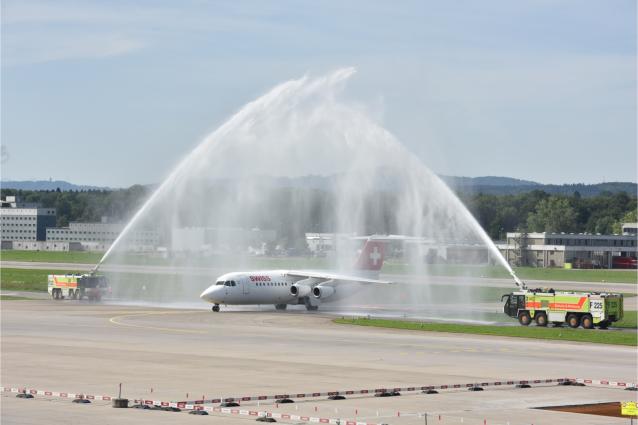Swiss International Air Lines (SWISS) removed the final Avro RJ100 from flight operations today after over 15 years as part of its fleet. The last of a total of 21 aircraft took off from Geneva this morning and made its last official landing at Zurich airport.
Immediately after landing in Zurich, the aircraft registered under HB-IYZ received the traditional water fountain salute by the airport fire brigade before being officially taken out of service to loud applause from a crowd of employees and aviation fans. This special flight, operated under number LX7545, carried a mix of media professionals, staff and other guests. “Making this final landing at our home airport aboard an Avro was a very emotional experience for me! The taking out of service of the Avro aircraft marks the end of an era in the history of aviation in Switzerland” says Michael Weisser, Captain and Avro fleet chief, who performed the flight from Geneva to Zurich with his deputy fleet chief Captain Peter Huber.
The Avro RJ100 and its smaller version, the Avro RJ85, formed the backbone of the SWISS European fleet since the company was founded in 2002. The Avro fleet has completed over 700,000 hours in the air. During that time SWISS made over half a million flights with this British Aerospace (BAe) aircraft. With their record for excellent maintenance quality, these former SWISS aircraft remain in high demand despite their age, and will go into service with other airlines.
Extensive fleet renewal
SWISS continues to push ahead with the programme of fleet modernisation which it commenced in early 2016. By the end of 2018, another 20 Bombardier C Series aircraft will join the existing fleet of 10 currently deployed on our short and medium-haul routes. On the long-haul routes, two further Boeing 777-300ERs will replace part of the Airbus A340 fleet by spring 2018. All this means that SWISS will have one of the youngest fleets in Europe by the end of 2018.












